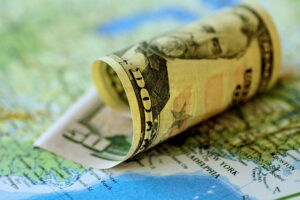Gov’t raises $2.5B from global bonds
THE GOVERNMENT has raised $2.5 billion from its sale of triple-tranche US dollar-denominated global bonds, its second foray into the international debt market this year. “We are very pleased to see the overwhelming investor interest in our new $2.5-billion triple-tranche global bonds,” Finance Secretary Ralph G. Recto said in a statement. “In fact, compared with […]

THE GOVERNMENT has raised $2.5 billion from its sale of triple-tranche US dollar-denominated global bonds, its second foray into the international debt market this year.
“We are very pleased to see the overwhelming investor interest in our new $2.5-billion triple-tranche global bonds,” Finance Secretary Ralph G. Recto said in a statement. “In fact, compared with our regional peers, the Philippines’ issuance achieved among the best pricing in all of our tranches this year. This is a resounding vote of confidence in our country’s solid credit profile.”
The total amount raised was in line with Mr. Recto’s earlier target of $2 billion to $2.5 billion.
The Bureau of the Treasury (BTr) said the 5.5-year bonds, maturing on March 5, 2030, have a yield of 4.375%. This was priced 35 basis points (bps) tighter than the initial guidance.
The new 10.5-year bonds, maturing on March 5, 2035, were priced at 4.75%, 30 bps tighter than the initial guidance.
The new 25-year sustainability bonds, which will mature on Sept. 5, 2049, have a yield of 5.175%. This was 32.5 bps tighter than the earlier guidance.
The BTr said it issued the bonds as benchmark yields were moderating due to the dovish US Federal Reserve stance, supporting market expectations of a rate cut in September.
“The 5.5-year spread is the tightest among all US dollar 5/5.5-year issuances by the (Philippines) since June 2021, while the all-in yield for the 10.5- and 25-year is the tightest among all US dollar 10/10.5-year and 25-year issuances by the (Philippines) since March 2022,” the BTr said.
National Treasurer Sharon P. Almanza said the tight pricing of the global bonds reflects “continued confidence in the country’s creditworthiness and robust economic performance.”
“The exceptionally tight pricing across all offerings enables the government to conserve on interest payments, thereby allowing more fiscal space to flow into transformative investments,” she said in a statement.
IFR reported that the government raised $500 million from 5.5-year bonds; $1.1 billion from 10.5-year notes; and $900 million from sustainability bonds.
Total bids reached $4.86 billion, IFR said. The 5.5-year notes fetched bids worth $860 million from 65 accounts.
For the 10.5-year bonds, bids reached over $2.2 billion from 121 accounts. Books for the 25-year bonds reached over $1.8 billion from 103 accounts.
BNP Paribas, Citigroup, Goldman Sachs, HSBC, JPMorgan, Morgan Stanley, Standard Chartered and UBS were tapped as joint lead managers and bookrunners. HSBC, Standard Chartered and UBS were joint sustainability structuring banks.
The government plans to borrow $5 billion this year, of which $2 billion was raised from the issuance of global bonds in May. The $2.5 billion raised from the latest dollar bond issuance, leaves $500 million that has yet to be raised.
In a text message, Mr. Recto said the remaining amount in the government’s offshore borrowing plan would come form either euro bonds or Samurai bonds.
Rizal Commercial Banking Corp. Chief Economist Michael L. Ricafort said in a Viber message the rates awarded were at narrow spreads compared with the benchmark US Treasury yields.
“Spreads below 100 basis points are considered unusually low/cheap for the National Government,” he said.
“Thus, the government saved on borrowing/financing costs with yields among the lowest in more than seven months and spreads among the tightest.”
Union Bank of the Philippines, Inc. Chief Economist Ruben Carlo O. Asuncion said in a Viber message the awarded yields were attractive to investors as rates are expected to continue declining as the US Federal Reserve begins its easing cycle.
“These are attractive yields and have investors very interested. As an investor, you’re locked in before US Fed rate cuts happen and yields start to dwindle further,” he said.
Bank of the Philippine Islands Lead Economist Emilio S. Neri, Jr. in a Viber message said the government had timed the issuance well as benchmark rates could move higher in the coming weeks, which would have cost the government more.
“The issuances are timed pretty well resulting in relatively tight ranges across the announced tenors versus their global benchmarks. Benchmark rates could move higher in the coming weeks, which could cost the BTr a lot more,” he said.
Fitch Ratings assigned a “BBB” rating to the bonds, while Moody’s Ratings gave it “Baa2” and S&P Global Ratings assigned it “BBB+.” These mirror the Philippines’ issuer ratings.
The bonds were drawn from the Philippine government’s existing shelf program, which includes tranches maturing in 2030, 2035 and 2049. — Aaron Michael C. Sy with inputs from Beatriz Marie D. Cruz
















